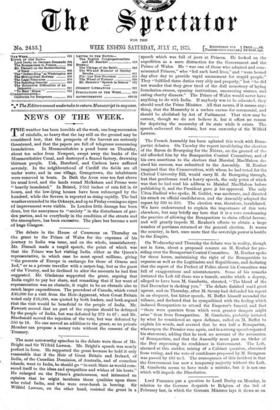The most noteworthy speeches in the debate were those of
Mr. Bright and Sir Wilfrid Lawson. Mr. Bright's speech was nearly perfect in form. He supported the grant because he held it only reasonable that if the Heir of Great Britain and Ireland, of India, of the Canadian Dominion, of Australia, and of countless islands, went to India, he should go "in such State as would com- mend itself to the ideas and sympathies and wishes of his hosts." He enlarged on the Prince's graciousness, and intimated an opinion that he might inculcate those qualities upon those who ruled India, and who were over-harsh in bearing. Sir Wilfrid Lawson, on the other hand, resisted the grant in a
speech which was full of jeers at Princes. He looked on the expedition as a mere distraction for the Government and the Prince of Wales. He "was one of those who admired and com- miserated Princes," who "led such hard lives," and "were bound day after day to provide vapid amusement for stupid people." They "fulfilled these duties very ably and properly," but "he did not wonder that they grew tired of the dull monotony of laying foundation-stones, opening institutions, uncovering statues, and eating charity dinners." The Prince of Wales would never have anything to do with India. If anybody was to be educated, they should send the Prime Minister. All that means, if it means any- thing, that the Monarchy is a useless excuse for ceremonial, and should be abolished by Act of Parliament. That view may be correct, though we do not believe it, but it offers no reason for depriving the monarchy of its state while it exists. The speech enlivened the debate, but was unworthy of Sir Wilfrid Lawson.


































